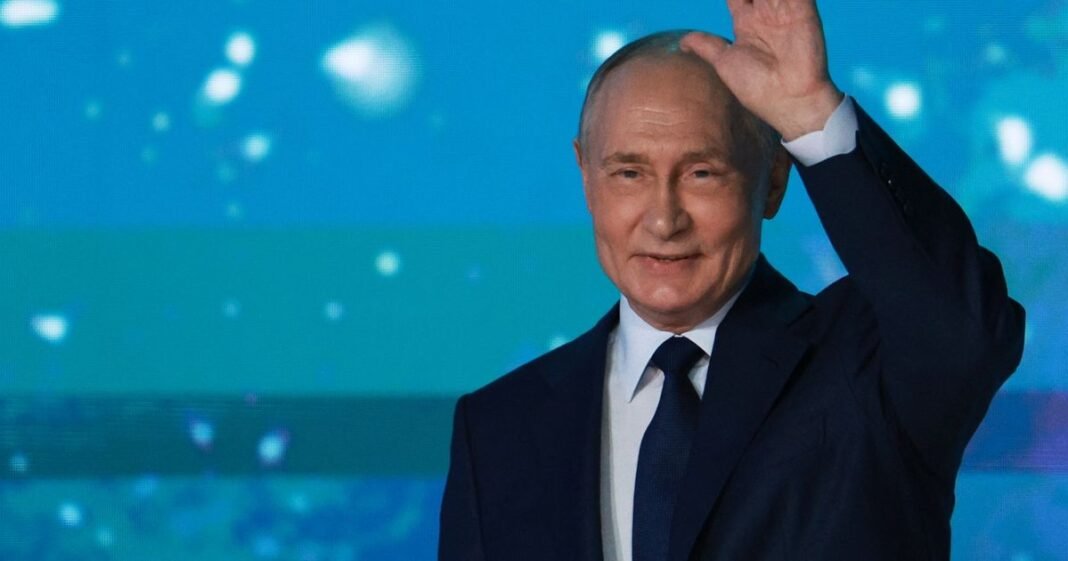Ukrainian president Volodomyr Zelensky has sparked new speculation about Vladimir Putin‘s health after he claimed the Russian despot “will die soon“.
Rumours about the 72-year-old’s health have swirled in recent years, with former intelligence chiefs and sources within Russia among those to have alleged he could be seriously – or even terminally – ill. Some commentators have claimed that his decision to invade Ukraine in 2022 was in part prompted by a growing sense of his own mortality, with the former KGB man said to have become increasingly concerned with cementing his legacy after becoming paranoid during the Covid pandemic. Here’s everything we know about Putin’s health:
Volodymyr Zelensky predicted that Putin “will die soon” this week as he discussed the war on Ukraine. Speaking during a round table with journalists including the BBC’s Jeremy Bowen, the Ukrainian leader said: “He will die soon, and that’s a fact, and it will come to an end.”
One of the leading theories about Vladimir Putin’s health is that he has a form of Parkinson’s disease. Sir Richard Dearlove, a former head of MI6, said last year that ongoing concerns over the Russian president’s health were likely down to the progressive disorder, which begins with shaking symptoms before leading reduced mobility and brain damage.
Responding to a question about “how well or sick” the Kremlin leader is, the former MI6 boss responded: “I do not have a clear answer to that, but I have contacts and friends still in eastern Europe who think that there is something fundamentally wrong with him medically. But I’m not a clinician.”
He added that it was “probably Parkinson’s, which of course has different representations, different variations, different seriousness. But if the man is paranoid – and I think the murder of Navalny might suggest a certain paranoia – that is one of the symptoms.”
Many of the health rumours have been prompted by footage of the Russian president jittering and trembling involuntarily. The first reports of this began around 2022, and have persisted in the years as more videos have emerged of him twitching his arms and legs during televised appearances.
Earlier this month, Putin was seen shaking “uncontrollably” during a meeting with Belarusian President Alexander Lukashenko, and at one point appeared to use his hand to try and stop his hand moving. In November, he appeared unable to control his movements while giving an hour-long speech at a podium in Kazakhstan. Visible spasms began in his left foot, before spreading to both legs and feet.
While some have claimed that these are signs of Parkinson’s, one of Putin’s former speechwriters suggested last month that he had instead suffered a mini-stroke. Abbas Gallyamov told the Daily Express: “He definitely has some problems. Journalists are writing about cancer, but what we saw back in 2022 looked more like the consequences of a mini-stroke.”
Rumours of Vladimir Putin suffering from cancer have persisted for many years. In 2014, an unnamed German doctor claimed that Putin was receiving treatment for an “often terminal” form of the disease, though this was denied by Russian government spokesman Dmitri Peskov.
More recently, this talk has pointed in the direction of pancreatic cancer. Alleged medical documents leaked to the media in 2023 showed that Putin had been visited by surgeon Yevgeny Selivanov at least 35 times at his Black Sea resort home in Sochi, add further fuel to the speculation.
Vladimir Putin’s puffy face and enlarged cheeks has led to claims that the Russian president is ill, and has to take steroids. Steroids can change the appearance of people’s faces, and are also used in the medical treatment of a number of different medical conditions, ranging from back pain to cancer.
At Reach and across our entities we and our partners use information collected through cookies and other identifiers from your device to improve experience on our site, analyse how it is used and to show personalised advertising. You can opt out of the sale or sharing of your data, at any time clicking the “Do Not Sell or Share my Data” button at the bottom of the webpage. Please note that your preferences are browser specific. Use of our website and any of our services represents your acceptance of the use of cookies and consent to the practices described in our Privacy Notice and Cookie Notice.
